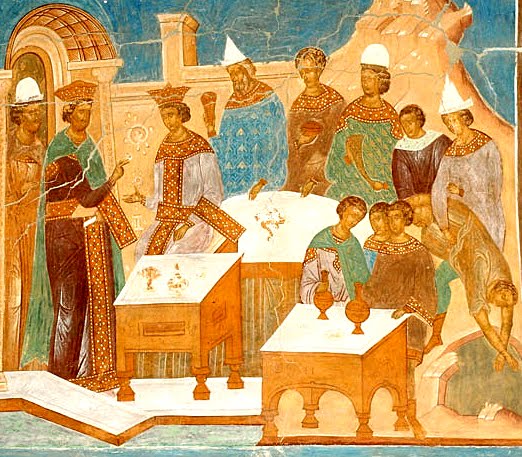This post is about the second section of Theology of the Body (highlighted):
Part 1: Who Are We? Establishing an Adequate Anthropology
After taking up the meaning of Christ's appeal to the beginning, John Paul II now focuses on Christ's appeal to the heart... the inner man... in this second and longest part of TOB. The first part went back to Genesis and to our "beginning", to which Christ pointed us back to when He said "in the beginning it was not so". Christ now points to the heart of his listeners, the Pharisees, and speaks to them about the state in which we also find ourselves... sinfulness, after the fall. No longer are we in the state of original innocence to which Christ pointed to, in which everything functions as God created it to be, but we live with the effects of sin, which Christ now calls "hardness of heart". We are the HISTORICAL MAN, to which Christ says now in Matthew 5:27-28 "Whoever looks to desire has committed adultery in the heart."
To explain this "look of desire" John Paul II turns back to the reflection on original innocence, in which the birth of this negative look is described. Creation was pure gift. Adam was created as God's very image and the world was given to him as a gift. He was created for Eve and Eve was created for him, they were "naked without shame"... In original innocence, Adam saw Eve in the fullness of her person. He understood that she was like him, a sister in humanity and that she was a gift from God... he exulted in poetry: "Flesh of my flesh!" He understood that she was made for him vice versa and that they were called to interpersonal communion.
Adam, and all of us, failed the test of trust. A key part in this description of Genesis, which seems to be highlighted, is when Adam and Eve cast doubt on the gift. He doesn't believe that everything was created well and for his own good. He believes in the words of the tempter, "You will be like gods, knowing good and evil" and doesn't trust that the one who created him loves him and knows best. "By casting doubt in his heart on the deepest meaning of the gift, that is, on love as the specific motive of creation and of the original covenant (see Gen 3:5), man turns his back on God-love, on the 'Father.' He in some sense casts hims from his heart." (TOB 26:4)
After this decisive breach, Adam and Eve suffer various effects of sin, from which we also suffer today. A new element shows up: shame. "The birth of shame shows us the moment in which the inner man, 'the heart,' by closing itself to what 'comes from the Father,' opens itself to what 'comes from the world" (TOB 28:5). They hide themselves from God: "In this perspective, Adam's words in Genesis 3:10, 'I was afraid, because I am naked, and I hid myself,' seem to express the awareness of being defenseless, and the sense of insecurity about his somatic structure in the face of the processes of nature that operate with an inevitable determinism" (TOB 27:4). Not only is there this shame toward God, but they feel shame toward one another, and so a also a closure to each other. They covered their bodies. The body now, in the dimension of the world, is also unprotected. While in the beginning Adam looked at Eve and understood from the simplicity and fullness of her body also the value of her person, now their sexuality is an obstacle in their relationship. They are no longer united, but now set against each other. Adam no longer exclaims love poetry about his beloved, but blames her for the state in which they find themselves. The body is still a sign of love the way God created it to be and "does not cease to arouse the desires for personal union, precisely due to masculinity and femininity" (TOB 31:3), but now the way they look at the body is differnt. There is the negative look of desire which Jesus talked about in the Sermon of the Mount. "Your desire shall be for your husband, but he will dominate you" (Gn 3:16). "The communion of persons - which consists in the spiritual unity of the two subjects who gave themselves to each other - is replaced by a different mutual relationship, namely, by a realationship of possession of the other as an object of one's own desire" (TOB 31:2). "I give myself to you" changes to "I use you".
Sexual desire and sexual pleasure are in themselves good, says John Paul II, but desire becomes negative (lust) when it sees only one dimension of the person and reduces the full attractiveness of that person to the attractiveness of sexual pleasure alone. Adam can no longer see with purity. The meaning of the body doesn't change... but our vision and way of living this in the body is changed. No longer is the spirit revealed and seen through the body as naturally as it was created to. There is an interior imbalance, with roots in this original distrust, fear and shame. "The body is not subject to the spirit as in the state of original innocence, but carries within itself a constant hotbed of resistance against the spirit and threatens in some way man's unity as a person" (TOB 28:3).
The relationship in which both people were gifts to one another required a certain type of balance, in which both gave themselves freely to one another and in this "reciprocal 'belonging' of the persons who, uniting in wuch a way as to be 'one flesh' (Gen 2:24), are at the same time called to belong to each other" (TOB 33:3). The words of Genesis 3:15, in which man dominates over woman, certainly point to a new imbalance and also seems so suggest it happens more at the the woman's expense, even though the woman also uses in a different way. It seems though that the "man ought to have been 'from the beginning' the guardian of the reciprocity of the gift and of its true balance" (TOB 33:2).
In this negative desire, the next step after domination is enjoyment. "Flaring up in the man, it invades his senses, arouses his body, draws the feelings along with itself, and in some way takes possession of the 'heart.' ... Once the inner man has been reduced to silence and passion has, as it were, gained freedom of action, passion manifests itself as an insistent tendency toward satisfying the senses and the body. ... the man whose will is occupied with satisfying the senses does not find rest nor does he find himself, but on the contrary 'consumes himself.'" (TOB 39:2)
What Jesus says on the Sermon of the Mount is that the looks expresses what is in the heart. Shifting the blame of adultery from the body to the heart, he points his listeners to their own experiences of inner detachment. This negative desire and negative look is a reduction: a reduction in the way of viewing that reflects a closure to God and to the other, a closure of the horizon of the mind and the heart. We are once again pointed towards man's very intentions.
Although this imbalance and negative desire to use the other comes from the heart, this doesn't mean that this defines the heart. Christ's appeal to the beginning makes this clear... this is not what we were created to be! Man is called to rediscover the true and FULL meaning of the body... this is, that we were created by Love, created to love and be loved. "The words of Christ, who in the Sermon on the Mount appeals to the 'heart,' lead the listener in some way to such an inner call. If he allows them to work in him he can at the same time hear in his innermost [being] the echo, as it were, of that 'beginning,' of that good 'beginning' to which Christ appealed on another occasion to remind his listeners who man is, who woman is, and who they are reciprocally: one for the other in the work of creation." (TOB 46:5)
On the Sermon of the Mount, Christ is correcting a wrong way of understanding moral purity, that had developed as exclusively external and "material". "Christ opposed it in a radical manner: nothing makes a man unclean 'from the outside'; no 'material' dirtiness makes a man impure in the moral sense. No washing, not even ritual washing, is by itself suited to produce moral purity. Moral purity has its wellspring exclusively in man's interior: int comes from the heart." (TOB 50:3) The impurity is not in the vision, but in the appetite. With the effects of sin, the spirit no longer rules the body as naturally as it did in original innocence. In this hotbed of resistence, we do what we don't want to and don't do what we want, as St. Paul says. But Christ brought a new vision and a new way to restore love to what it was created to be. The heart becomes a battlefield, in which we should learn to open ourselves to be strengthened within, in order to do "what the Spirit wants" (TOB 51:2). Erotic desire, understood in the Christian tradition, impels us in this direction. We must open our hearts to the "fullness of 'eros,' which implies the upward impulse of the human spirit toward what is true, good, and beautiful, so that what is 'erotic' also becomes true, good and beautiful." (TOB 48:1) We must recover ownership of our heart, in order to ever be able to give it to someone. "Within the sphere of this knowledge, man learns to distinguish between what, on the one hand, makes up the manifold richness of masculinity and femininity in the signs that spring from their perennial call and creative attraction and what, on the other hand, bears only the sign of concupiscence." (TOB 48:4)
This battle in the heart is summed up in the last part of this section with the teaching on purity. John Paul II elaborates on the two types of purity, both equally important, understood in a Pauline way as "life according to the Spirit" (TOB 57:6). "From purity springs that singular beauty that permeates every sphere of reciprocal common life between human beings and allows them to express in it the simplicity and depth, the cordiality and unrepeatable authenticity of personal trust." (TOB 57:3) "The satisfaction of the passions is, in fact, one thing, quite another is the joy a person finds in possessing himself more fully, since in this way he can also become more fully a true gift for another person. The words Christ spoke in the Sermon on the Mount direct the human heart precisely toward this joy. We must entrust ourselves, our thoughts, and our actions to Christ's words in order to find joy and give it to others." (TOB 58:7)
 |
Titian's Sacred and Profane Love
Can you guess which woman represents sacred love and which one represents profane love?
It might surprise you that the one wearing a dress symbolizes profane love, while the nude symolizes sacred love, which is unprotected and has no fear. |
and a little snippet of music: http://www.resonanceofthegift.com/Loss_and_Hope.html












































